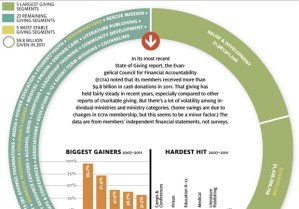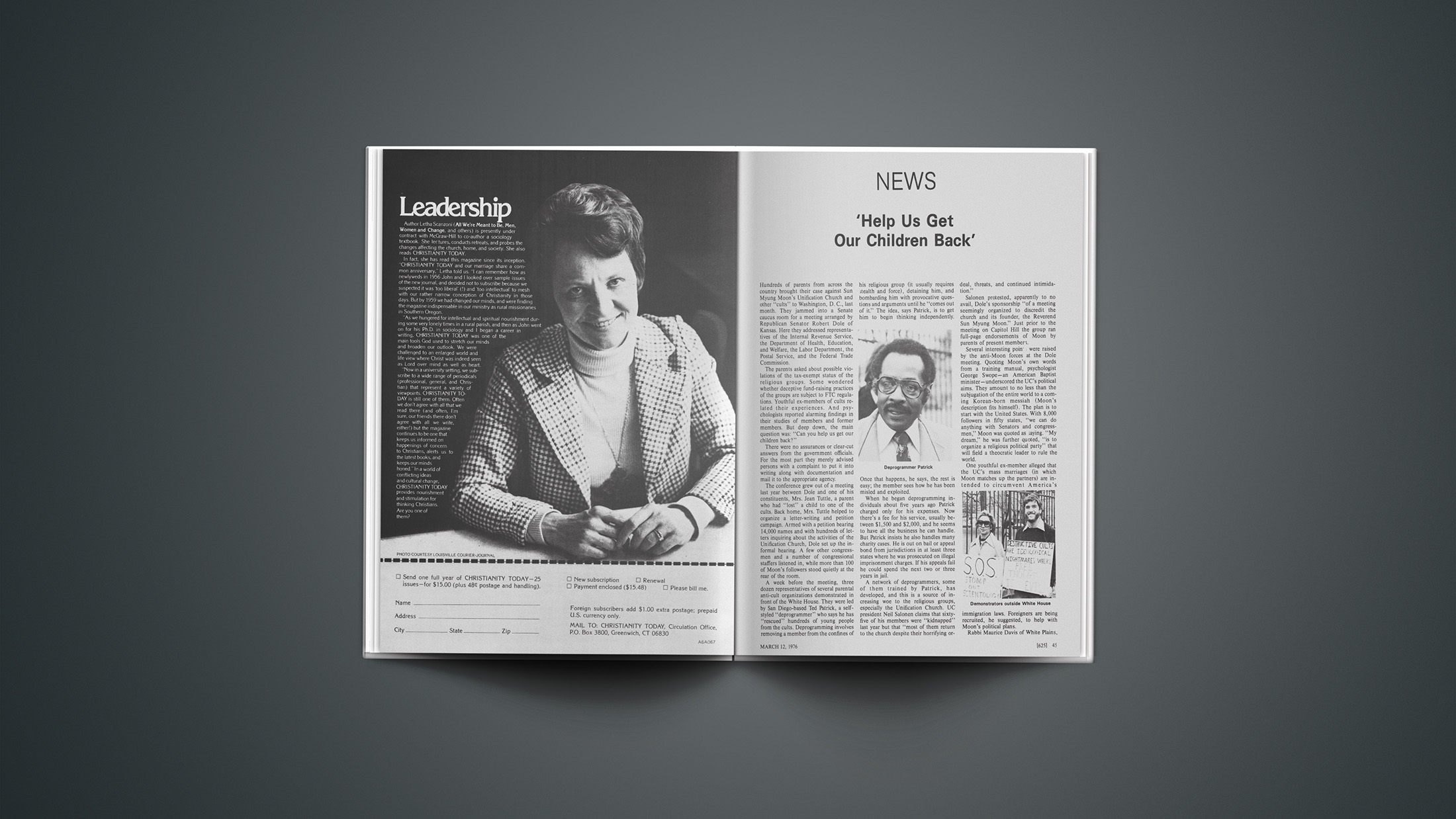In this series

A tip for Christian ministries: Millennials will give you more money if you encourage them to make a “meaningful” gift rather than a “generous” one.
The Evangelical Council for Financial Accountability (ECFA) surveyed more than 16,500 people who had recently donated to 17 of its member ministries. Researchers studied both millennial givers and those over the age of 35, comparing the differences in order to draw a profile of the millennial Christian giver.
Almost all millennials surveyed by the gave to their church in the past few years (92%). About a third gave to denominational ministries (35%); slightly more gave to secular charities (39%).
“Understanding the next generation is crucial for nonprofit organizations, and ECFA is pleased to offer insight into this important segment of givers,” ECFA president and CEO Dan Busby stated. “Millennials see the world in a whole new way, and gaining access to this lens is the only way organizations will stay relevant. Donors under the age of 35 are passionate about life and connected deeply to causes they care about—an encouraging sign for nonprofit organizations endeavoring to do good work in the world today.”
They’re definitely passionate. When millennials give to a ministry for the first time, they’re more likely than those over 35 to feel hopeful (69% vs. 60%), generous (45% vs. 25%), and spontaneous (18% vs. 11%). In fact, they’re more likely to feel every emotion ECFA asked about.
“Millennials show a broader and richer range of emotions than any previous generation,” stated the ECFA report, suggesting that it’s “perhaps because of their limited experience.”
Perhaps also a result of their youth, millennials are less likely than older generations to worry about ministries keeping administrative costs low; assuming that a one-time gift is a promise of future giving; or contacting a donor for more money. They’re also slightly less concerned about ministries using a gift only for what they say they will; not increasing the frequency of donation requests; avoiding political causes; or saying thank you.
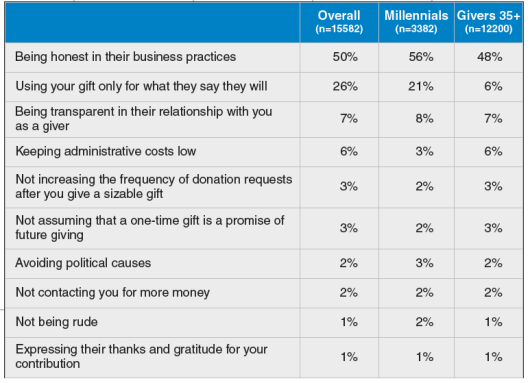
When asked about the most important quality of a ministry, more than half of millennials (56%) and nearly half of older givers (48%) named honesty, followed by another form of honesty: using a gift only as specified (21% of millennials vs. 26% of older givers).
All givers felt that charities should uphold specific financial standards, but millennials were less likely (85% vs. 93%) to list it as “extremely important.”
Younger givers choose Christian organizations because they share Christ and spread the gospel (37% vs. 32% of older givers) and because they serve spiritual and physical needs (21% vs. 13%).
Meanwhile, older givers are choosing Christian charities because they believe they have more integrity and accountability than secular organizations (26% vs. 19% of millennials).

While older givers are more likely to trust Christian organizations, millennials are significantly more likely to say that someone might give to a secular organization because it’s more effective and efficient (22% vs. 12%). They’re also slightly more likely to see giving to a secular organization out of a mistrust of Christian agencies (11% vs. 8%).
Younger givers are also more likely to suggest that donors might give to a secular charity because they are unaware of Christian options (13% vs. 6%), which may suggest “they themselves feel less informed,” stated ECFA.
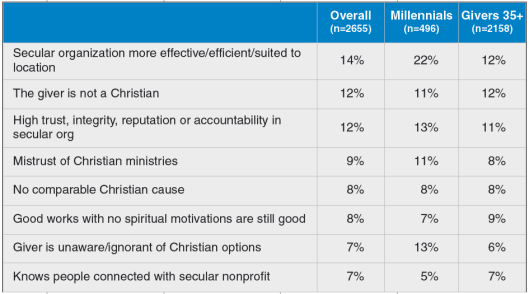
Most givers say they give because they’ve been blessed. Younger donors are slightly less likely to say they give because their gift makes a difference (20% vs. 23%), and slightly more likely to give to a charity that employs someone they know (11% vs. 8%). A similar percent of millennials said they’re more likely to give because of the person asking (12% vs. 7%).
Younger givers were also more interested in hearing from charities than older givers were. More said they’d prefer communication every two to three weeks (9% vs. 4%) or every month (35% vs. 29%), while fewer said they’d only like a message every six months (12% vs. 17%) or a year (11% vs. 19%).
Their actions bear this out. Millennials pay closer attention to every form of communication—except postal mail—that they receive from charities.
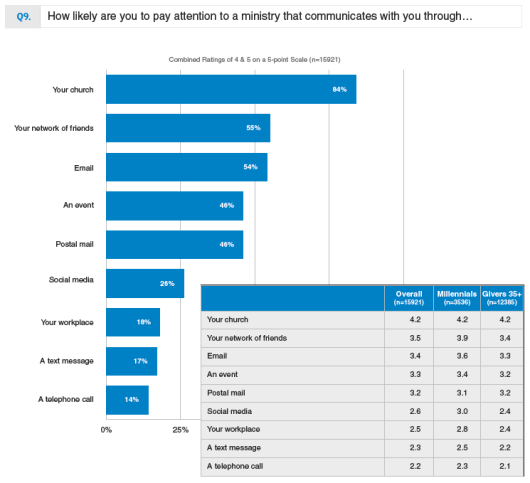
Millennials are also more interested in getting involved themselves. They’re a little more likely than older givers to donate to ministries or people groups they care about, or that offer a way to volunteer or to join the team. Nearly 1 in 3 looks for volunteer opportunities when considering a donation (29% vs. 20%).
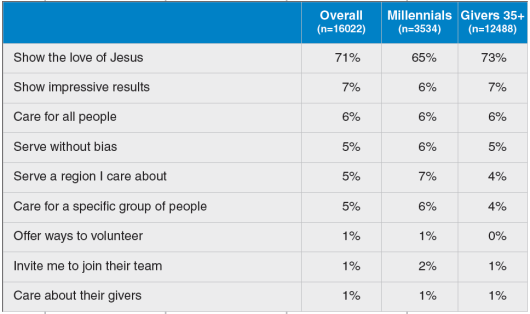
Volunteer opportunities might be why more than half of millennials said they’re more likely to support ministries that benefit their community (53% vs. 47% of older givers). They’re also interested in providing food, water, shelter, sanitation, and education. And they’re more likely to support caring for the poor and orphans, addressing injustices, or advocating for a cause.
Older givers are more interested in charities that evangelize, translate and distribute Bibles, teach Christians, aid in disaster relief, or strengthen marriages or families.
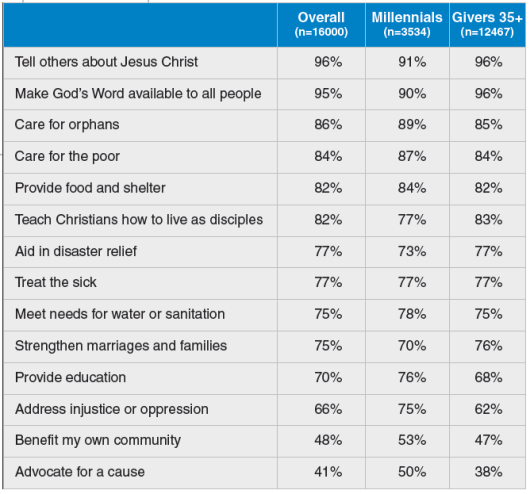
While both older and younger givers were very likely to give to their church (about 95% overall), younger givers are less likely to give to both denominational ministries (35% vs. 52%) and to secular organizations (39% vs. 49%). Of the two, they’re more likely to give to secular than to denominational efforts, unlike their older counterparts.
Nine out of 10 millennials give as they feel the Lord is leading them (92%), considering their budgeting priorities before they do (92%). They’re considerably more likely than older givers to ask others for their thoughts (57% vs. 48%) before giving.
“Ninety percent of ministry givers research a ministry on its website before giving a ‘generous’ gift, and millennials are considerably more likely to do research ‘all the time,’” stated ECFA. “They are also significantly more likely than their elders to pursue research on a third-party website.”
The sites they’re checking? Probably ECFA and the Better Business Bureau’s Give.org. A Donor Confidence Index poll showed that almost 3 in 5 of all millennial givers were familiar with the sites, while 2 in 5 knew about Charity Navigator and GuideStar.
While younger givers are more likely to support their charity on social media (26% vs. 18%), they’re doing it less than researchers thought they would.
“Contrary to popular notions, millennials are more unlikely than likely to promote ministries on social media,” the report stated. “They participate in social media because of who they are … they give because of who they are … and promoting a ministry is about what the ministry is.”
Indeed, more millennials say they give because of who they are (52% vs. 48% of older givers) or who asks (12% vs. 7%); fewer donate because the ministry asks (21% vs. 33%).
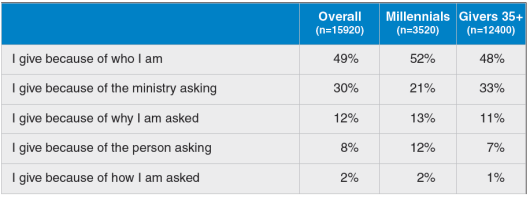
Ministries might want to consider asking millennials for a “meaningful” gift instead of a “generous” one.
“Millennials respond with a 20 percent higher optimal gift if asked for a ‘meaningful amount,’” the report stated. “In contrast, their older counterparts respond with much higher amounts when they are asked for a ‘generous’ gift than a ‘meaningful’ one.”
But millennials will likely give that donation in the same way older givers do—as an occasional or monthly gift.






